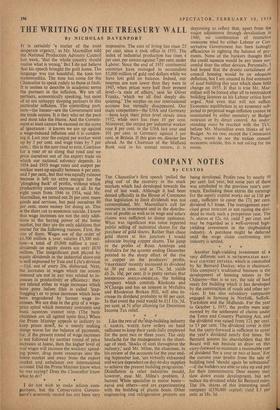COMPANY NOTES
By CUSTOS
THE Chancellor's first speech 'pulled the plug out' of the recovery in the stock markets which had developed towards the end of last week. Although it had been denied officially in the House of Commons that legislation to limit dividends was not contemplated, Mr. Macmillan's call for restraint in investment and in the distribu- tion of profits as well as in wage and salary claims was sufficient to damp optimism. What was significant was some reported public selling of industrial shares for the purchase of gold shares. Rather than chase gold shares at this juncture I would advocate buying copper shares. The jump in the profits of Roan Antelope and Mufulira for the quarter ending December pointed to the sharp effect of the rise in copper on the producers' profits. 'CHARTERED' recently increased its dividend to 30 per cent. and at 73s. 3d. yields £6 2s. 10d, per cent. It is pretty certain that RHODESIAN ANGLO-AMERICAN, the holding company which controls Rhokana and N'Changa and has an interest in Mufulira and Rhodesian Broken Hill, will also in- crease its dividend probably to 80 per cent. In that event the yield would be £11 11s. 5d. per cent. at 5+ after allowing for Dominion Income Tax relief.
* * * Like the rest of theship-building industry i. SAMUEL WHITE have orders on hand sufficient to keep their yards fully employed for the next two or three years. The only headache for the management is the short- age of steel. 'Stocks of steel throughout'the industry,' said Mr. Milne, the chairman, in his review of the accounts for the year end- ing September last, 'are virtually, exhausted and we are dependent on day-to-day supplies to achieve the present building programme.' Disinflation in other industries should, however, ease Mr. Milne's problem. J. Samuel White specialise in motor boats— naval and others—and are experimenting with the building of plastic boats. Other engineering and refrigeration projects are being developed. Profits rose by nearly 50 per cent. last year, but some part of these was attributed to the previous year's con- tracts. Excluding these extras the earnings for the equity capital works out at 110 per cent., sufficient to cover the 17+ per cent. dividend 6.3 times. The management exer- cised great restraint in not raising the divi- dend to mark such a prosperous year. The 5s. shares at 12s. 6d. yield 7 per cent. and may be regarded as a well-covered high- yielding investment in the shipbuilding industry. A purchase might be deferred until the wage claim confronting this industry is settled.
* * Another high-yielding investment of a very different sort is METROPOLITAN RAIL- WAY COUNTRY ESTATES. which is controlled by Sir Bernard Docker, who is chairman. This company's traditional business is the development of housing estates in the Chilterns—that is to say, the sale of land ready for building which it has developed by the construction of roads and other ser- vices. It has also subsidiary companies engaged in 'farming in Norfolk, Suffolk, Yorkshire and the Midlands. For the year to October 1, 1955, the profits were aug- mented by the settlement of claims under the Town and Country Planning Act, and the dividend was raised from 12+ per cent. to 15 per cent. The dividend cover is thin but the carry-forward is sufficient to cover the year's dividend nearly five times. Sir Bernard assures his shareholders that the Board will not hesitate to draw on this carry-forward to maintain a reasonable rate of dividend 'for a year or two at least.' For the current year 'profits from the sale of building land 'should again be substantial' —if the builders are able to take up and pay for their Commitments. Dear money may slow down estate development, but not reduce the dividend while Sir Bernard rules. The 10s. shares of this interesting small company (£350,000 capital)' yield 8.3 per cent, at 18s. 3d.


































 Previous page
Previous page